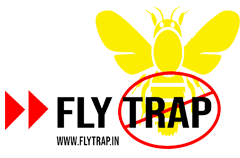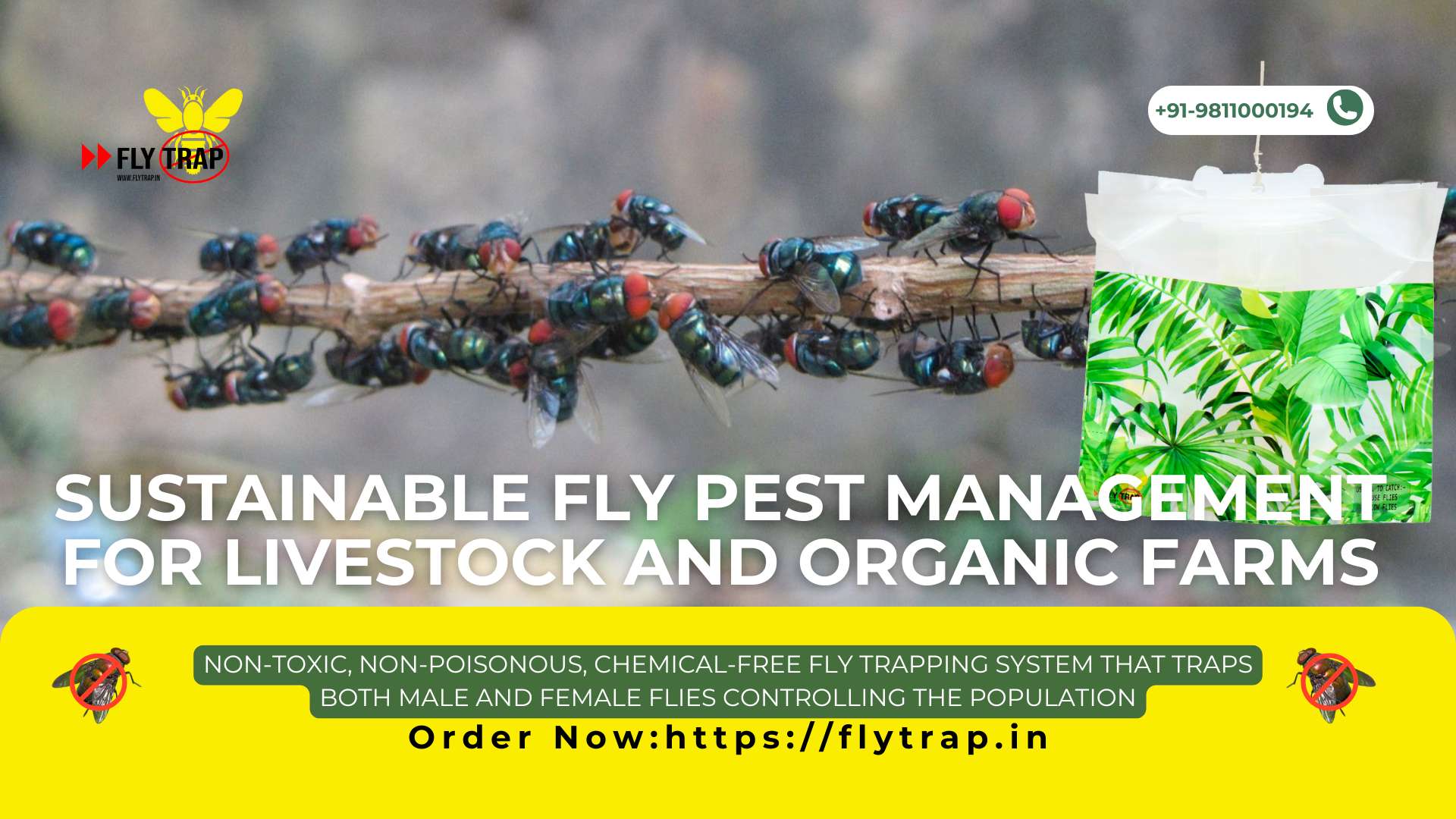
Flies are small insects, but they create big problems. The house fly (Musca domestica) is found all over the world. It lives in dirty, microbe-rich places and spreads many diseases. Flies can carry bacteria, viruses, parasites, and fungi on their body and in their waste. They can fly 1–2 miles in a day and sometimes as far as 20 miles, spreading germs wherever they go. Because of this, flies are a serious concern for public health, animal health, food safety, and farm productivity. And with this, fly pest management becomes crucial for livestock and farms.
How Flies Cause Problems
1. Public Health
- Flies spread quickly even around hospitals which threatens human health and safety.
- The public parks and gardens are their breeding grounds. Without proper care, the situation can be unnerving.
- Because of fly infestation, businesses can face complaints, penalties, bad publicity, and loss of customers.
- Flies reproduce rapidly which further worsen the problem.
2. Agriculture and Livestock
- Flies trouble dairy farms by irritating cows, buffaloes, and goats which reduces the milk production. Flies also carry various pathogens causing various diseases sometimes lethal to the animals.
- Flies contaminate fodder and other produce kept in farms and centers.
- Stud farms can host both biting flies, like horn flies, stable flies, horse flies, deer flies, black flies, which feed on blood, and non-biting “filth flies”, such as house flies, that feed on secretions and spread disease.
3. Economic losses
- Biting flies like stable flies can be painful for cows, buffaloes, and even non-biting ones like houseflies can transmit diseases. This leads to lower milk production which further lead to economic losses.
- Uzi flies in the sericulture directly harm the silkworms – the source of income to many.
- The cost of operations, penalties, the management, and quarantine is too high sometimes leading to total disruption.
3. Animal Health
- Flies irritate animals and spread diseases like mastitis, pink eye, and diarrhea.
- They can carry bacteria like Salmonella, E. coli, Campylobacter, and viruses like hog cholera and PRRSV.
4. Sericulture
- In sericulture, the Uzi fly lays eggs on silkworms, leading to heavy crop losses. Silkworms are the source of income and when that is under threat, the whole system collapse.
Flies grow in manure, spilled feed, garbage, and wet straw. Poultry manure with 75–80% moisture is especially good for breeding.
5. Antimicrobial Resistance (AMR)
- Flies can carry drug-resistant bacteria from animal waste to farms and communities.
- This makes it harder to treat infections in both animals and humans.
Traditional Fly Control Methods
For many years, farmers and industries relied mainly on insecticides:
- Sprays, fogs, and baits to kill adult flies.
- Larvicides and Insect Growth Regulators (IGRs) to stop fly larvae from becoming adults.
On-animal treatments like insecticide ear tags, pour-ons, and feed additives.
Problems with Chemicals
- Flies quickly develop resistance to almost every insecticide.
- Chemicals can harm useful insects, the environment, workers, and even food safety.
Some traps like electric zappers may spread germs by breaking fly bodies into tiny particles.
Sustainable and Organic Methods
To solve these problems, farmers are moving toward Integrated Pest Management (IPM) — a mix of safe, practical, and eco-friendly methods. This fly pest management practice is especially important for organic farms, where synthetic chemicals are not allowed.
Key IPM Practices
- Sanitation and Source Reduction
- Remove manure, waste, and decaying feed regularly.
- Keep barns and bedding dry; fix leaks.
- Compost manure to kill fly eggs.
- Manage pastures by breaking up dung pats or letting chickens scratch through them.
- Remove manure, waste, and decaying feed regularly.
- Exclusion (Prevention)
- Use mesh screens, air curtains, and fans to keep flies out of buildings.
- Keep doors closed and garbage covered.
- Use mesh screens, air curtains, and fans to keep flies out of buildings.
- Physical Controls
- Sticky traps, fly ribbons, and UV light traps catch flies without chemicals.
- Walk-through traps remove flies from animals as they pass through.
- Sticky traps, fly ribbons, and UV light traps catch flies without chemicals.
- Biological Control
- Parasitic wasps lay eggs inside fly pupae and kill them.
- Dung beetles and predatory mites eat fly eggs and larvae.
- Microbial insecticides (like Bacillus thuringiensis or nematodes) target fly larvae.
- Birds like ducks and chickens eat maggots and pupae.
- Parasitic wasps lay eggs inside fly pupae and kill them.
- Natural Repellents
- Oils from neem, basil, lavender, peppermint, eucalyptus, cinnamon, and others help repel flies.
- Oils from neem, basil, lavender, peppermint, eucalyptus, cinnamon, and others help repel flies.
These can be sprayed near entry points or used on animals.
Organic Fly Traps by Flytrap.in
A new eco-friendly option is organic fly traps, like those from Flytrap.in. These are safe, non-toxic, and effective.
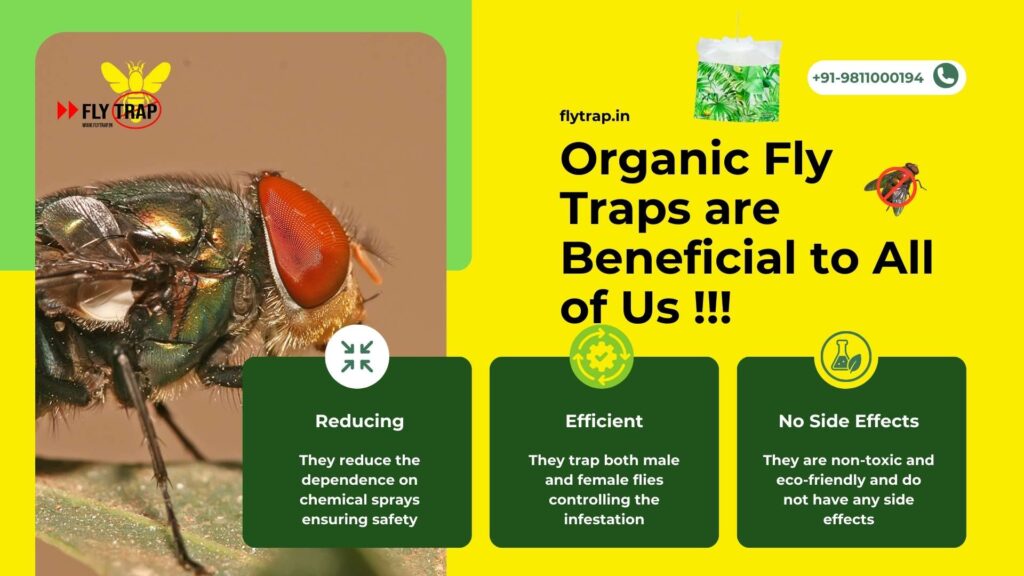
Features and Benefits:
- Made with biodegradable material and plant-based lure.
- Attracts both male and female flies (not pheromone-based).
- Simple to use: just add water and place in sunlight. Works up to 30 days.
- Flies cannot escape once inside.
- Easy and clean disposal in green bins.
- Works well in dairy farms, poultry, pig farms, fisheries, horse stables, gardens, restaurants, and garbage areas.
- Very effective against Uzi flies in sericulture, protecting silkworms.
- Results: 60–80% fewer flies in 3 days, healthier livestock, better feed intake, and improved cocoon yield in silkworms.
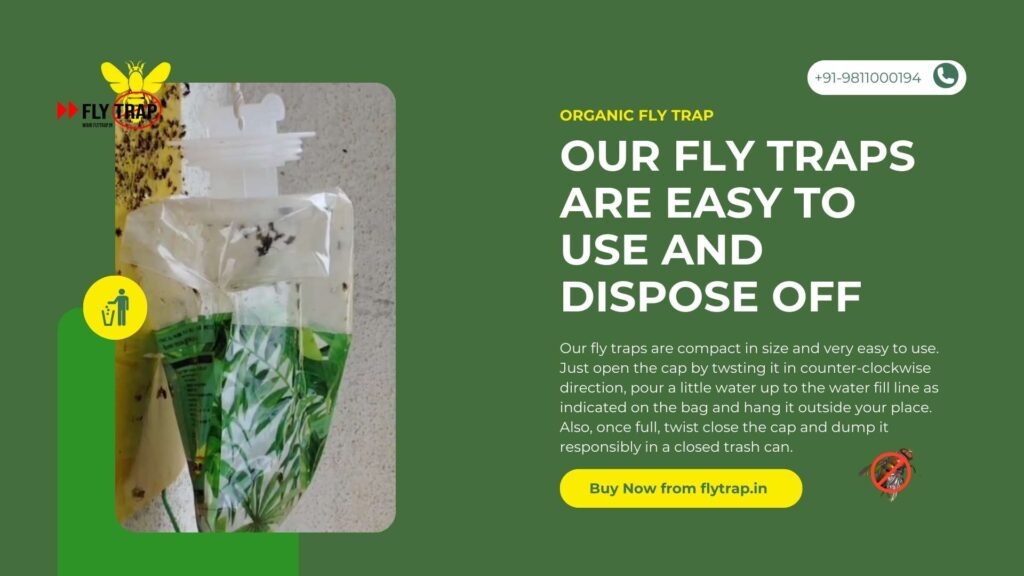
Cost-effective, sustainable, and safe for humans, animals, and the environment.
Flies are more than just a nuisance — they affect public health, animal welfare, food safety, and farm profits. Traditional chemical methods are losing effectiveness due to resistance and environmental concerns.
A sustainable approach using sanitation, prevention, physical and biological controls, natural repellents, and organic traps is the best way forward. Products like the organic fly traps from Flytrap.in show that it is possible to control flies effectively without harming people, animals, or nature.
This shift toward sustainable fly pest management is essential for healthier farms, safer food, and a cleaner environment.
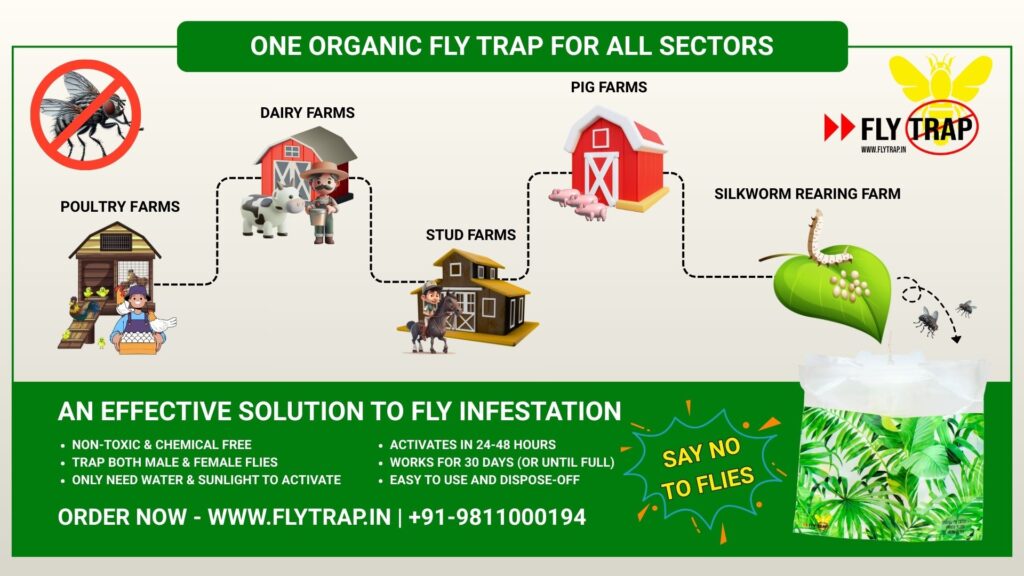
🛒 Order a Set of 3 Fly Traps – ₹699 (MRP ₹999) Free delivery across India.
📞 +91-9811000194 / Order on WhatsApp for bulk orders or to become an official distributor.
Compiled by Sanat Soi,
Co-authored by Avni Bindal, Flytrap.in
